

Maintaining a healthy smile for life is now more possible than ever, but sadly, it’s still fairly common for adults to lose one or more teeth over the years due to disease or injury. For many years, there have been traditional solutions such as dentures, but they have several drawbacks that often lead to additional discomfort and dissatisfaction.
While our team at Goodman Dental Care can’t turn back the clock on your teeth, we can offer the next best thing with dental implants. This revolutionary treatment replaces missing teeth in a virtually indistinguishable fashion, while providing excellent oral health benefits and aesthetics at the same time. Best of all, Dr. Gary Goodman and Dr. Jeremy Goodman can handle every step of the procedure right here in our office. Contact us today to schedule a consultation and find out how dental implants in Annapolis can benefit you!

The majority of tooth replacements simply sit on top of the gums, only replacing the visible parts of the tooth. Dental implants are the only option to rebuild the hidden root structure of the tooth as well. A dental implant consists of three parts: a titanium post, a metal attachment called an abutment, and a restoration. The post is surgically placed in the jawbone to act as an artificial root for a lost tooth. An abutment is placed on top, which anchors your restoration into place. Depending on how many teeth you’re missing, your restoration could be a personalized crown, bridge, or denture.
Because of their surgical placement in the jaw, dental implants are more beneficial than other solutions. They last longer, feel more natural, and restore more biting power, allowing you to eat all of your favorite foods with ease. That’s why our dentists usually recommend dental implants to all eligible patients.

Once we’ve determined that you’re a good candidate for dental implants, we’ll start by surgically placing them into the jawbone. While many doctors refer their patients to outside offices for this surgery, our doctors have the advanced training and equipment to perform it right here at Goodman Dental Care, giving you a more comfortable experience with a team you know and trust. In the rare case that we have to refer to you a specialist, our team will handle all communication so that you’re sure to receive the same quality of care that you would with us.
Although everyone’s dental implant journey differs, here are the four basic steps in the process:

You will first need a consultation with your dentist in Annapolis to ensure you’re a candidate for dental implants. Generally, if you have good oral and overall health, they are a suitable option; however, your medical and lifestyle history will also need to be discussed to look for any risk factors that may lead to dental implant failure, like issues the hinder your body’s ability to heal or fight infections.
Your dental health is also assessed using a digital x-ray and a CT scan to evaluate your oral structures. This allows us to see if any additional procedures are needed before placing your posts, like bone grafting or a sinus lift. The images also allow us to pinpoint the precise location for your implant posts.

The first stage of your treatment requires biocompatible implant posts to be surgically placed into your jawbone. The number of posts needed varies depending on how many teeth you are replacing.
A sedative or anesthesia is used to ensure your comfort during the surgery. Your dentist opens your gum tissue to expose your jawbone. A small hole is drilled into your bone for each post to be inserted into pre-determined locations. Your gum tissue is then sutured closed to allow the healing process to begin.

The implant posts stimulate new bone growth, allowing your jaw to fuse to the posts through a process called osseointegration. This can take several weeks or even months, but it is necessary to create a stable and lasting foundation for your prosthetic teeth.
After your jawbone has healed, you need a second minor surgery to attach abutments to your posts. These are connector pieces between the posts and your restorations. Your gum tissue is opened to expose the posts to place a fixture on each one. Over the next couple of weeks, your gum tissue heals around them. This creates a natural-looking gum line while also sealing out bacteria from the posts.

Digital impressions of your mouth are taken to carefully craft your restorations from all-ceramic material. The dental lab designs them with precision to meet your exact color, size, and shape needs for natural-looking results and optimal function.

Did you know that nearly 500,000 dental implants are placed each year? With a high success rate of initial placement around 98%, it’s hard to deny the incredible benefits of dental implants in Annapolis. From their increased longevity to their ability to mimic the natural tooth structure from the root to the crown, other tooth replacement solutions are simply not of the same caliber as dental implants. While they may replicate the look of your smile (i.e., fixed bridges, dentures), they will not keep your jawbone from deteriorating, resulting in changes that can occur and cost you more money to fix your prosthetic.
As you prepare to begin your dental implant journey, here are just a few more benefits you’ll want to know more about. Also, don’t be afraid to contact our office with any additional questions or concerns.




Dental implants may not be for everyone, but they’re definitely an option you’re going to want to consider. Almost anyone can get dental implants no matter how many teeth they’ve lost or need to have extracted. During the initial consultation, we can confirm whether you’re a good candidate, and if any potential complications are found, we can start planning preparatory treatments to address them so that implants are ultimately a viable choice in your case.

A good dental implant candidate will meet the following three criteria.
Not everyone can get dental implants right away. Sometimes gum disease therapy or bone grafting are required to address specific issues before the surgery can be performed. Also, if the tooth being replaced is still in your mouth, naturally it will have to be extracted first. Once all of the underlying issues have been addressed, we can start planning dental implant treatment based on how many teeth are missing.
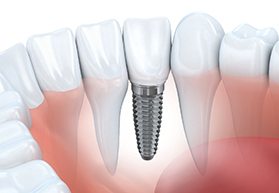
Sometimes it’s not hard at all to figure out how many dental implant posts are going to be required. When only one tooth is missing, naturally only a single dental implant is going to be required. You might have heard that a dental bridge is the traditional solution for a single missing tooth, but while this can be effective, it requires us to make changes to your natural smile. Specifically, we have to shave off small amounts of enamel from the teeth adjacent to the gap in order to place the bridge. With dental implants, however, we can replace the tooth without weakening natural dental structures.
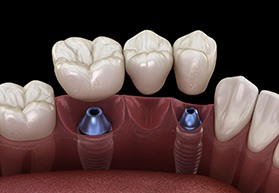
There are two possible implant solutions for multiple missing teeth, and the one that’s right for you is going to be determined by how many gaps there are. When all of the missing teeth are in a row, you can get two dental implant posts to support a single dental bridge to completely fill in the empty space. But for multiple gaps throughout the mouth, a partial denture will be used instead. The number of dental implants used to support a partial denture varies due to the highly customizable nature of the restoration.
At some point, you may lose all of your natural teeth. Traditional dentures will allow you to continue speaking and eating somewhat normally, but if you have them attached to 4 to 6 dental implants, you won’t have to worry about them slipping or losing their fit. The minimal number of implant posts will be used while still giving your new teeth the best possible stability and functionality.

Many experts consider dental implants to be the ideal way to rebuild smiles after tooth loss because of their unique placement in your jawbone. That means this treatment involves oral surgery, so it often costs more upfront than alternatives. However, you might not pay the same rate as someone else because the total can vary significantly based on your unique circumstances.
Continue reading to learn more about how the price of dental implants is determined and how our office helps make services more affordable!

Before proceeding with this procedure, you must schedule a consultation with one of our providers to ensure you’re a good candidate. During your visit, our team will update your medical history and examine your mouth to determine whether you’re healthy enough to undergo surgery successfully.
We’ll need to treat any areas of concern, such as tooth decay or gum disease, that might interfere with the results. You’ll be responsible for the cost of any additional treatments necessary to prepare your mouth for dental implants. Then, the surgery itself incurs its own costs. Our team performs the procedure in the office, so there is no need to pay for an outside provider.
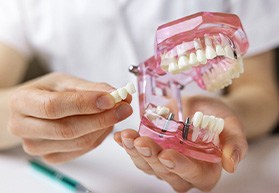
These restorations are customized at each stage of their design and creation to meet your unique needs, though the cost might vary depending on different factors, such as:

It’s natural to question whether it’s worth investing in dental implants when there are less expensive options available. With that said, there are additional benefits to this treatment that can help save money over time which you might not have considered.
For instance, dentures often become destabilized or dislodged, which can cause them to chip, crack, or break. That means they’re more likely to require costly relining, repairs, or replacements more frequently. Furthermore, maintaining them involves additional accessories, such as adhesives or special soaking solutions, the cost of which can add up over time.
Meanwhile, dental implants help preserve your jawbone, which prevents additional tooth loss. They also tend to be more resilient and last longer than dentures or bridges, which can save you money on expensive fixes over time.

Most dental insurance plans do not cover the cost of dental implants, though there may be benefits that can be applied to reduce the cost of your treatment. For instance, your policy might cover your examination and imaging and up to 50% of your dental crown or other restoration, helping to reduce your out-of-pocket expenses.
If you’re unsure what is included in your plan, our team is happy to file claims and paperwork on your behalf to help maximize your available benefits.

This treatment has the power to transform your smile’s appearance and functionality, but you might hesitate to schedule a consultation if you’re concerned about the cost. However, our team in Annapolis doesn’t want your current financial situation to keep you from receiving a quality restoration you can count on.
That’s why we offer flexible payment plans through third-party financers, CareCredit and Lending Club. If your application is approved, you can divide the total cost of your treatment into more manageable installments over a designated period.

When teeth have been missing for an extended period of time, bone deterioration is very likely to occur – and unfortunately, a lack of bone can be a serious obstacle during dental implant placement. We can offer a number of procedures that can help regrow or replace bone as necessary, making it easier for your implants to succeed in the long run. Don’t forget to ask us about bone grafts or sinus lifts during your initial consultation!
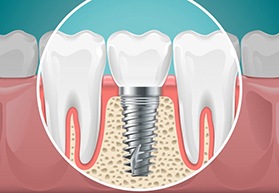
The goal of bone grafting is to identify areas where there isn’t enough tissue and then repair the jaw in those areas. This also encourages the growth of new bone tissue.
Bone grafts typically work by placing existing bone tissue into the jaw. The tissue can come from another part of your mouth or the rest of your body; for example, many grafts take bone from the hip. Sometimes the tissue will be provided by a separate human or animal donor. In certain circumstances, we may even use a synthetic material. (This type of graft is often referred to as an alloplast.)
Once the bone graft has been performed, it might be possible to place the implant posts right away. However, if you had a more substantial cases of bone loss, you’ll need to wait a few months. While the mouth heals during this time, new bone is created.
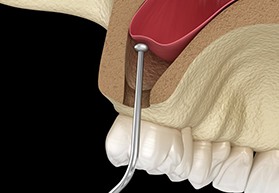
While a bone graft may be recommended in many different situations, a sinus lift is only performed when we specifically need to replace the teeth near the back of the mouth in your upper jaw. Sometimes after tooth loss occurs, the sinuses collapse so that they fill the space where the implants need to be inserted. We can’t perform the surgery while they’re in the way, so in this situation a sinus lift will be performed.
After making an incision in the gums and removing a small amount of bone, we’ll push on the membrane separating the sinus from the mouth, lifting it up. We’ll then fill the space with new bone tissue; like with a bone graft, this will add density to the jaw and encourage new bone to form. This normally takes about three to six months, though of course your body’s personal healing capabilities will affect this timeframe.

After investing months of your time and money into your newly restored smile, it’s important to know how to care for your dental implants in Annapolis so you can get the most out of them. Fortunately, because your restorations are fixed to the implant posts, you won’t have to worry about removing and cleaning them—you’ll be able to clean them just like you would your natural teeth. With routine brushing, flossing, rinsing, and taking a few additional precautionary measures, you could be able to enjoy your dental implants for decades to come.

One of the top causes of implant failure is the development of an infection called peri-implantitis, which occurs around the soft tissues and bone structures that secure your dental implants in place. It’s caused by harmful oral bacteria accumulation as a result of poor oral hygiene, which can be prevented when you continue brushing twice each day for two minutes, flossing daily, and rinsing your mouth regularly with an antimicrobial wash.

What you eat can have an impact on your oral health and, in turn, your dental implants. When you switch out more processed foods that contain sugars and carbohydrates that harmful oral bacteria love to feed off of for healthier snacks, like fresh fruits and vegetables, you can help reduce your risk of developing an oral infection.

Bad habits like opening packages with your teeth, crunching on ice, or biting your nails can increase your chances of not only developing an infection, but also damaging your restorations. Try to be mindful of when you do these habits and put measures in place to prevent them from happening, like grabbing a stress ball to keep your hands busy so you don’t bite your nails.

If you participate in contact sports or any hobbies that could put your new teeth at risk, or you grind and clench your teeth at night, consider investing in a custom-tailored nightguard or athletic mouthguard. These are made from durable acrylic and are specially designed to provide your facial muscles, teeth, gums, and jaw joints with maximized protection. That way, you won’t have to worry about experiencing oral trauma that could land you a visit to your emergency dentist!

Just like with your natural teeth, bi-annual checkups and cleanings will remain a crucial part of your routine for dental implant care in Annapolis. During these visits, your implant dentist can make sure that your new restorations are functioning properly and address any damage or oral health problems earlier on, before they have a chance to wreak havoc on your new smile.

Dental implants in Annapolis are a great investment. Although you’re excited to get started on your journey to a complete smile, it’s normal to be a bit apprehensive. We know you have several questions before you’re ready to commit to the treatment. We take the time to carefully explain your procedure to address your concerns during your initial consultation. While you wait for your appointment, here are the answers to a few of the most common questions to help you make the best choice for your smile.
Unfortunately, if you’ve lost teeth from gum disease, you cannot get dental implants until after the infection has been treated. Gum disease is preventable, but at least 50% of Americans have it. The infection can be treated quickly in the earliest stage without causing any long-term damage, but it often goes undetected. As the infection worsens, it destroys the supporting structures for your teeth, leading to tooth loss.
Besides tooth loss, it can compromise your jawbone’s density, making you an unsuitable candidate for dental implants. You can stop the infection and repair the damage with periodontal therapy and bone grafting. After your oral health has been restored, you can complete your smile with dental implants.
Dental implants are the next best thing to your real teeth. They are the only treatment to replace the entire structure of your tooth, including the root. Your jawbone fuses to the implant post to provide a stable foundation for your replacement tooth. In fact, you can regain as much as 70% of your biting force to enjoy your favorite foods again. You’ll never need to worry about any slipping or irritation, so you can smile and speak confidently.
The first step in your treatment is your placement surgery, which has the longest recovery time. Since it involves oral surgery, it’s normal to be worried about pain while you heal, but many patients report it to be no worse than a tooth extraction.
After your implant posts are placed, your gum tissue will be healed in a couple of weeks, but your jawbone will need more time. The implant posts stimulate your jaw to encourage new bone growth. Over the next several weeks, your jawbone fuses to the posts through a process called osseointegration. This allows them to potentially remain in place forever.
Dental implants are the most predictable and reliable tooth replacement option, but they can fail. The risk of implant failure is generally less than 5%. Most often, it’s the result of a preventable infection called peri-implantitis. You can reduce your risk of complications by maintaining your oral hygiene at home and visiting your dentist in Annapolis at least twice a year for a cleaning and checkup.
We want you to feel confident in your decision to replace your missing teeth. If you have questions about dental implants, don’t hesitate to ask. We look forward to rebuilding your smile!
In general, dental implants in Annapolis are not recommended for patients younger than 18. Most people’s jaws aren’t fully developed until young adulthood, with men’s jaws typically taking longer to develop than women’s jaws do. Some people’s jaws don’t fully develop until they have reached their mid-20s. If dental implants are placed before the jaw is finished growing, it could interfere with further bone development and potentially result in complications. For this reason, we typically recommend other restorative options to our younger patients with missing teeth.
If you’re interested in dental implants, you may want to consider quitting tobacco. Smokers can undergo implant treatment, but they have a higher rate of implant failure compared to nonsmokers. Smoking, chewing, or even vaping tobacco can interfere with an implant’s ability to fuse with the jawbone. Smoking can also cause dry socket, a painful condition that occurs when the blood clot that forms over the implant site is removed. If you’re unwilling or unable to kick the habit entirely, you should at least quit two weeks before the procedure and wait for at least two or three months afterward before resuming smoking.
No. Dental implants are artificial and not made of enamel, so they cannot get cavities. However, your remaining natural teeth are still susceptible to tooth decay. In addition, the gums around a dental implant can still become infected. Untreated gum disease can lead to bone loss that undermines the integrity of an implant. For these reasons, you will still need to practice excellent oral hygiene after getting dental implants and visit an implant dentist in Annapolis every six months for a checkup and cleaning.
Yes! Not only can dental implants restore the appearance and function of your smile, but they can also make you look younger overall. Whenever you enjoy a meal, the force of biting and chewing spreads through the roots of your teeth to stimulate your jawbone. However, when teeth go missing, the jawbone loses that stimulation and begins to deteriorate. If your jawbone shrinks and can no longer support your facial structures, you may eventually appear more wrinkled, with a sunken-in face and fine lines around your mouth. Dental implants are the only type of restoration that can stimulate the jawbone like natural teeth and keep you looking young and vibrant.
Modern dental implants have been around since the 1970s. Several decades earlier, a Swedish orthopedic surgeon discovered that he couldn’t remove a small titanium cylinder he had placed in a bone to study the healing process. This discovery kicked off more scientific research into implant treatment and the development of the modern titanium implants used today. However, if we go even further back, in 600 A.D. archeologists discovered ancient Mayan skulls with pieces of seashells and carved stones like jade replacing missing teeth. Some of these early dental implants had actually fused to the jawbone. Thankfully, modern dental implants in Annapolis are much more reliable and precise!